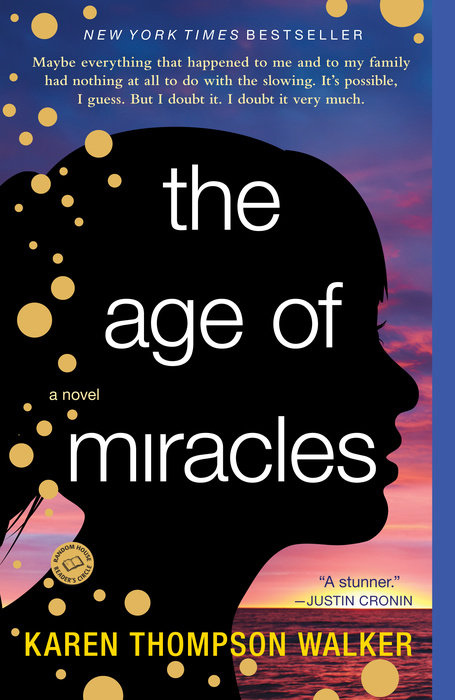I’m now at the age where time is a villain in a horror movie. Time is frightening to me—hours lost at bad dinner parties, seconds stolen in conversation with dullards. I’m a control freak, and time is the biggest and baddest of beasts, mysterious and confounding. In real life, it is terrifying to navigate the collapsing tunnel of aging; some days sprint by, some days I am bitten by nostalgia and overwhelmed by sadness.
Published in 2013, Karen Thompson Walker’s THE AGE OF MIRACLES is a sneak attack of a book that deserves to be read. Ostensibly, the plot hangs on a bit of science, but don’t let that scare you away: the earth’s rotation has slowed, days extended by fifty-six minutes. The main character is a perfectly imagined twelve-year-old named Julia, but this is not young adult fiction. Not at all. Walker’s particular genius is in stitching together a towering Frankenstein out of something as tiny as minutes.
THE AGE OF MIRACLES is the scariest book I have ever read. Some people read apocalyptic fiction because they like to imagine how they would survive—I already know the answer to that question. (When the zombies come, I will eat nine boxes of Benadryl and binge-watch Dynasty until my heart stops.)
THE AGE OF MIRACLES was so frightening because the apocalypse begins as an annoyance, like a lipstick that has melted. Walker’s greatest device is that the end of the world comes incrementally, almost casually, and each turned page winds the reader just a little more tightly. There have been several books that I could not put down, but there has never been a reading experience that caused me to pace in laps around my house, the novel held tight to my chest, clutched nervously like a string of pearls.
The beauty of this book is how Walker flips it. Suddenly there is too much time, too many hours of daylight. For most people, this would be a luxury. All that sun added an extra level of panic for me; the book takes place in California, where you can already grow avocados in your front yard year-round. I live in Montana, where we do not tan. Walker’s book gave me the opposite of seasonal affective disorder; her harrowing descriptions made me long to read the book underneath a black parasol.
Time is most frightful to me when viewed from a vantage point. Walker writes at a distance—the dread of Julia’s day-to-day life is only heightened by the author’s masterful control. It would have been an easy choice to make Julia shrill, whiny. Walker writes Julia so delicately that her first love and subsequent heartbreak don’t seem like distractions from the mayhem; they only serve to softly echo the destruction of the world around her.
I actually called my mother after finishingTHE AGE OF MIRACLES, seeking solace. When I hung up the phone, I unconsciously checked my watch. Instantly, all of the horror returned. That is the testament of a damn fine book. Karen Thompson Walker has written a modern classic. I don’t want to be coy, but THE AGE OF MIRACLES is well worth your time.









